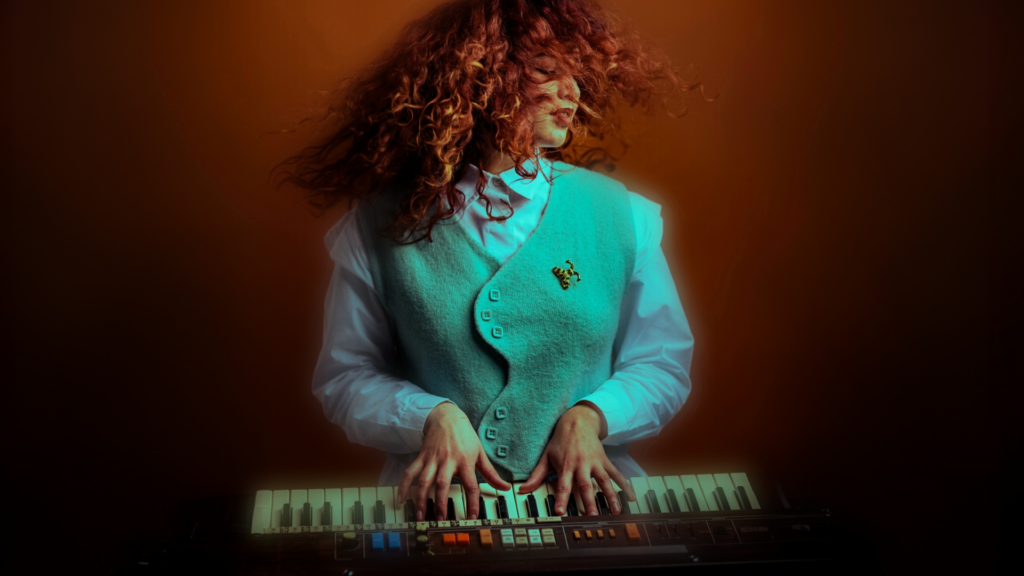Featured image: Jodi Hartley
Manchester’s musical history is nothing short of legendary. Between Joy Division’s post-punk innovations, Britpop royalty Oasis and the booming indie rave scene that sparked ‘Madchester’, the city has been a stomping ground for some of the most influential artists in British music history. Now, festivals like Parklife and OUTBREAK continue to cement its reputation as a hub for sonic discovery, luring global audiences eager to experience Manchester’s creative energy. But beyond these internationally recognised names lies a network of independent artists and grassroots venues working to amplify the homegrown talent coming up through Manchester’s music scene.
Musician Ellen Beth Abdi knows this world well. A mainstay of Manchester’s scene, she’s worked with city legends such as New Order and A Certain Ratio whilst building a genre-spanning career. For Abdi, collaboration is at the core of what makes the city’s music culture so special. “People will hold your hand and then watch you fly,” she says. “People have your back, which I think has made everything a lot easier. There’s not this competition – it’s quite egalitarian.”
Community support is palpable in Manchester, she says: “As much as the artists collaborating is important, having that crowd and having the weight of people behind you is something that is really strong in Manchester. Everyone is very congratulatory and supportive, even if they’re not a musician or artist.”
Abdi’s roots in Manchester run deep. Having grown up here, she went to study at The Royal Northern College of Music, a decision that felt natural and inevitable. “I don’t think you’d have me down as a homebody, but everything is here so I’ve had no reason to move – I love it here,” she says.
Crediting the amazing people and opportunities she encountered while part of Manchester’s huge student body for shaping her, Abdi jokes about the air of mystery surrounding Manchester’s suburbs as she recalls a memory from her student days: “I felt like an expert on Manchester. I’d say “Let’s go to Hulme!”, and people would go “Oh my God, where’s that?” and I’d think ‘It’s ten minutes down the road, just hop on a bus and see where it goes!’”
The lack of recognition of the culture coming out of Manchester’s suburbs (read: anywhere but Oxford Road or the Northern Quarter), is a topic close to Abdi’s heart, such as Matt & Phreds as essential springboards for small artists.
“You need venues that people go to on a regular basis where they don’t know who they’re going to see,” she says. “Venues like The Carlton Club [in Whalley Range], Fuel and Withington Public Hall [in Withington] are doing great work in the suburbs of Manchester and putting on really amazing shows. I’ve done so many gigs in those venues, and most musicians in Manchester will have passed through them at some point because it’s a rite of passage. Just don’t take those places for granted.”
The ongoing cost of living crisis continues to throw up challenges for young creatives navigating the industry: “There’s basically no money and there’s very little infrastructure, especially for people who are starting out,” Abdi explains. She says that as venues close amid a lack of investment in the grassroots “it’s basically impossible for working-class artists to get a foothold.
“That’s something that drastically needs to change because we’re not going to see a single working-class artist on stage in the next ten years if it continues this way,” she says.
Though funding cuts for arts ventures threaten independent hopefuls, Abdi credits community efforts for helping to keep the local music community alive. Manchester has a tightly interwoven community of musicians, promoters, record store owners and radio DJs – all of which, Abdi says, play a crucial role in pushing artists into the spotlight.
“Community radio in Manchester is so good. Legacy 90.1 is one of my favourite radio stations – it’s what Manchester DJs listen to in their cars. They don’t just play music, they advertise community events. They’re true community spaces,” says Abdi. Other Mancunian institutions she champions include Piccadilly Records in town and Chorlton’s King Bee record shop.
Abdi is keen to shift the focus from the usual suspects to the lesser-known pioneers who have shaped the city’s sound in more understated ways. “Everyone can reel off the big bands,” she says, “but Manchester has a massive Black music history. Manchester street soul changed the face of electronic music in the UK, and that’s often not part of the conversation.” She adds: “It’s the unsung heroes and the vocalists and producers that I want to celebrate.”
For emerging musicians, Abdi’s advice is simple: immerse yourself in the scene and engage with what’s around you. “Go to a different gig every week, even if you don’t know who’s playing. Go and talk to people and get involved as much as you can because there are loads of opportunities. Just look for it and you will find your people.”
In Manchester, where music thrives on mutual support, that community spirit remains the foundation for everything.
Follow @ellenbethabdi on Instagram






Leave a reply